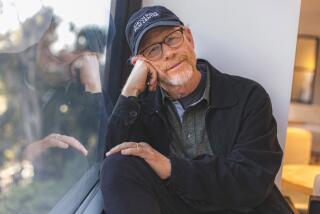HENDERSON’S CAREER SWINGS TOWARD SINGING
- Share via
Being between engagements is the seemingly constant state for actors and musicians. Being between careers is an even more demanding state for Bill Henderson, a man whose singing talents are known to the jazz world and whose character acting is known to television and film audiences.
The pendulum now is swinging toward singing and the Chicago-born Henderson is preparing for his return to the jazz clubs. (He opens a two-night stint at Le Cafe on Friday.)
“It was the mail,” Henderson recently said, explaining his decisions to go back to the clubs. “I would get these letters asking when I was going to sing, again.
“My heart hasn’t changed and I wasn’t trying to put it (singing) aside,” he said, adding matter-of-factly, “but there was no money. That is a consideration after all.”
Henderson, stoutly built, his eyes shaded by the brim of one of his ever-present hats, speaks to thoughtful circumspect. He allows his voice to break into frequent dialects and accents and he is given to short bursts of knowing laughter in the middle of what might be a serious point.
The subject of his long-lived trio, a group that featured the pianos of Joyce Collins and Dave MacKay and the three voices, demands particular caution from Henderson.
“We reached an end,” he said. “It was successful, but it wasn’t going anywhere.”
There was a certain sadness to his voice as he reflected on his decision to leave the trio.
“I thought we could have really upset things,” he recalled, reminding of the Grammy nominations for two of the group’s albums (“Street of Dreams,” “Sings Johnny Mercer”). “In the end, though, I had to walk away from it.”
Henderson walked back to acting, a career direction begun in 1970 by his working as a “gofer” for Bill Cosby when the comedian had his first television show after “I Spy.”
“I did everything on that show,” recalled Henderson, “and when they needed an actor. I was an actor.”
Henderson sees little disparity between the roles of singing and acting.
“I found I could read a line,” he began, a short burst of astonished laughter accenting his point, “and I realized that reading a script is like (reading) lyrics. When the words are bad, it’s not going to happen.”
Born 56 years ago, Henderson grew up in the musically stimulating Chicago of the ‘40s and ‘50s. He began singing at an early age and found himself working the multitude of clubs that were scattered throughout the Windy City’s South Side. Although a jazz fan early on, it wasn’t until his 1958 recording of “Senor Blues” with pianist Horace Silver in New York that he was included in the jazz world.
“That record is what established me as a jazz singer,” said Henderson of the hit single.
Henderson continued working as a single in New York, recording his own records for the Vee-Jay label and making others with Jimmy Smith, Hank Jones and Oscar Peterson.
In 1965, the late Eddie (Lockjaw) Davis introduced Henderson to Count Basie.
“I brought in a lot of my own music, arrangements by Al Cohn and Don Byas,” he said. Henderson’s book was like an arms’ shipment to battle the inevitable comparisons to Basie’s “Number One Son,” Joe Williams, who had left the band in 1961.
“I didn’t do Joe’s songs,” Henderson noted, shrugging off the notion.
“But I was the new fish,” he laughed, recalling many a rough moment when, in an established routine of band hazing, his tunes would be counted off at the wrong tempos. “I could take that, you see, but I drew the line at standing on the bus. I got on the bus and told ‘em that I was gonna sit. Al Aarons and Eric Dixon both made room for me.”
Room for Henderson has been in plentiful supply ever since, though the singer has decided when to avail himself of that space.
“I like adventure and there’s some edge you gotta have,” he said. “I been acting to have some fun; I’ve always had fun singing. And now, working with (pianist) Tad Weed and (guitarist) Mundell Lowe, I’ll have some more fun.”
More to Read
The biggest entertainment stories
Get our big stories about Hollywood, film, television, music, arts, culture and more right in your inbox as soon as they publish.
You may occasionally receive promotional content from the Los Angeles Times.










